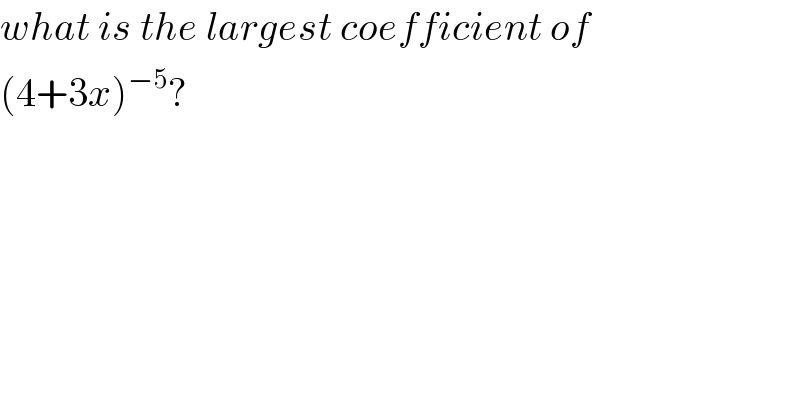
Question and Answers Forum
Question Number 125697 by aurpeyz last updated on 13/Dec/20

Answered by mr W last updated on 13/Dec/20
![(4+3x)^(−5) =4^(−5) [1−(−((3x)/4))]^(−5) =(1/(1024))Σ_(k=0) ^∞ C_4 ^(k+4) (−((3x)/4))^k =(1/(1024))Σ_(k=0) ^∞ (−1)^k C_4 ^(k+4) ((3/4))^k x^k =Σ_(k=0) ^∞ a_k x^k a_k =(((−1)^k )/(1024))C_4 ^(k+4) ((3/4))^k positive coef. when k=even=2n negative coef. when k=odd=2n+1 to find the largest coef. we only need to look at positive coefficients, i.e. k=2n. a_(2n) =(1/(1024))C_4 ^(2n+4) ((3/4))^(2n) a_(2(n+1)) =(1/(1024))C_4 ^(2n+6) ((3/4))^(2(n+1)) to find the largest coef. we need to find the smallest n satisfying a_(2n) >a_(2(n+1)) i.e. (1/(1024))C_4 ^(2n+4) ((3/4))^(2n) >(1/(1024))C_4 ^(2n+6) ((3/4))^(2(n+1)) C_4 ^(2n+4) >C_4 ^(2n+6) ((3/4))^2 (((2n+4)!)/(4!(2n)!))>(((2n+6)!)/(4!(2n+2)!))((3/4))^2 ((16)/9)>(((n+3)(2n+5))/((n+1)(2n+1))) 16(2n^2 +3n+1)>9(2n^2 +11n+15) 14n^2 −51n−119>0 n>((51+(√(51^2 +4×14×119)))/(28))≈5.3 the smallest n is 6, i.e. the largest coefficient is a_(12) : a_(12) =(1/(1024))C_4 ^(16) ((3/4))^(12) =((241 805 655)/(4 294 967 296)) you can check this with WolframAlpha:](Q125701.png)
Commented by mr W last updated on 13/Dec/20

Commented by aurpeyz last updated on 13/Dec/20

| ||
Question and Answers Forum | ||
Question Number 125697 by aurpeyz last updated on 13/Dec/20 | ||
 | ||
Answered by mr W last updated on 13/Dec/20 | ||
![(4+3x)^(−5) =4^(−5) [1−(−((3x)/4))]^(−5) =(1/(1024))Σ_(k=0) ^∞ C_4 ^(k+4) (−((3x)/4))^k =(1/(1024))Σ_(k=0) ^∞ (−1)^k C_4 ^(k+4) ((3/4))^k x^k =Σ_(k=0) ^∞ a_k x^k a_k =(((−1)^k )/(1024))C_4 ^(k+4) ((3/4))^k positive coef. when k=even=2n negative coef. when k=odd=2n+1 to find the largest coef. we only need to look at positive coefficients, i.e. k=2n. a_(2n) =(1/(1024))C_4 ^(2n+4) ((3/4))^(2n) a_(2(n+1)) =(1/(1024))C_4 ^(2n+6) ((3/4))^(2(n+1)) to find the largest coef. we need to find the smallest n satisfying a_(2n) >a_(2(n+1)) i.e. (1/(1024))C_4 ^(2n+4) ((3/4))^(2n) >(1/(1024))C_4 ^(2n+6) ((3/4))^(2(n+1)) C_4 ^(2n+4) >C_4 ^(2n+6) ((3/4))^2 (((2n+4)!)/(4!(2n)!))>(((2n+6)!)/(4!(2n+2)!))((3/4))^2 ((16)/9)>(((n+3)(2n+5))/((n+1)(2n+1))) 16(2n^2 +3n+1)>9(2n^2 +11n+15) 14n^2 −51n−119>0 n>((51+(√(51^2 +4×14×119)))/(28))≈5.3 the smallest n is 6, i.e. the largest coefficient is a_(12) : a_(12) =(1/(1024))C_4 ^(16) ((3/4))^(12) =((241 805 655)/(4 294 967 296)) you can check this with WolframAlpha:](Q125701.png) | ||
| ||
Commented by mr W last updated on 13/Dec/20 | ||
 | ||
Commented by aurpeyz last updated on 13/Dec/20 | ||
 | ||